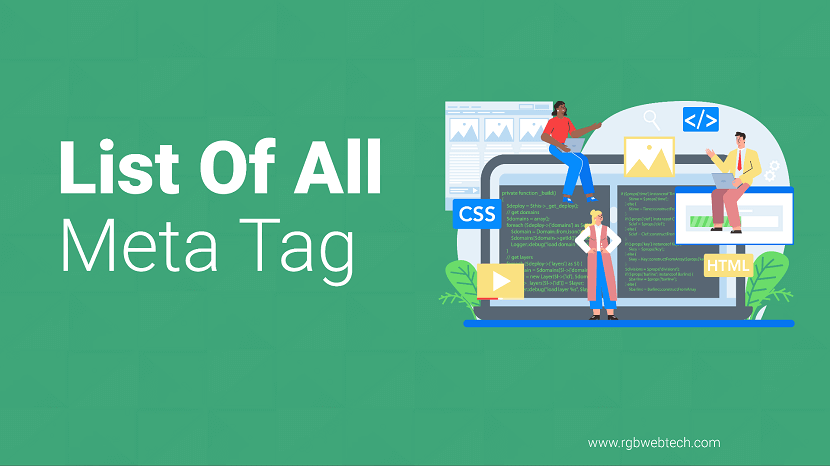Comprehensive List of Essential Meta Tags
Updated on January 15, 2025 by RGB Web Tech

Introduction to HTML Meta Tags
HTML meta tags are essential elements placed inside the head section of an HTML document. They don’t influence the visible content on the webpage but deliver crucial metadata to web browsers, search engines, and other online services. These tags help with rendering, SEO, and social sharing by providing specific instructions or information.
Essential HTML Meta Tags
Below are some of the most commonly used basic meta tags that play a vital role in website performance and visibility:
1. Viewport Meta Tag
This tag controls the layout and scaling of the webpage on different screen sizes, especially mobile devices.
2. Title Tag
Defines the title of the webpage shown in browser tabs and search engine results.
3. Meta Description Tag
Provides a summary of the page’s content. Often displayed below the title in search results.
4. Charset Meta Tag
Specifies the character encoding, ensuring proper display of text.
5. Author Meta Tag
Credits the content to its author or organization.
6. Robots Meta Tag
Gives instructions to search engine bots on whether to index or follow links on the page.
7. Canonical Tag
Helps prevent duplicate content issues by specifying the preferred URL.
Open Graph Meta Tags
Open Graph (OG) meta tags enhance how your content appears when shared on social media platforms such as Facebook, LinkedIn, and Pinterest.
Common Open Graph Tags:
These tags improve visibility, increase click-through rates, and make shared content more engaging.
Apple Meta Tags
Apple-specific meta tags are designed to optimize your webpage’s appearance and behavior on iOS devices.
Common Apple Meta Tags:
These tags enable full-screen display, customize icons, and improve user experience when your site is added to the home screen on Apple devices.
Internet Explorer Meta Tags
Although Internet Explorer (IE) is deprecated, some projects still require compatibility. IE-specific meta tags help ensure proper rendering.
Common IE Meta Tags:
Use these only when IE support is necessary; otherwise, modern web standards are preferred.
Facebook Meta Tags
Facebook utilizes Open Graph meta tags to format shared links. These are the same OG tags mentioned earlier, but optimized for the Facebook ecosystem.
Examples:
These tags ensure your content appears rich and informative when shared on Facebook.
Twitter Meta Tags (Twitter Cards)
Twitter Card meta tags let you customize how your content is displayed on Twitter.
Common Twitter Meta Tags:
Using these tags helps generate visually rich tweets and increases engagement.
Structured Data Markup (JSON-LD)
Structured data provides detailed context about your content, helping search engines display rich results.
Example Using JSON-LD:
Structured data complements meta tags by enhancing visibility in Google search results, enabling features like knowledge panels, rich snippets, and voice search integration.
Conclusion:
HTML meta tags are a fundamental part of web development, providing vital information to browsers, search engines, and social media platforms. Whether you're focusing on SEO, mobile responsiveness, or social sharing, using the right meta tags in your HTML document's head section is key to maximizing visibility and user experience.
If you found this article helpful, we encourage you to share it on your social media platforms—because sharing is caring! For more information about article submissions on our website, feel free to reach out to us via email.
Send an emailWritten by RGB Web Tech
SEO Checklist - Boost Your Website Ranking
Enhance your website performance with our Complete SEO Checklist. This detailed guide covers essential aspects like On-Page SEO, Off-Page SEO, Technical SEO, Backlink Building, Mobile Optimization etc. Follow our step-by-step SEO Checklist to improve search rankings, boost organic traffic, and achieve sustainable online growth. Start optimizing today!
Meta Name News Keywords
Updated on January 15, 2025 by RGB Web Tech

What is the "news_keywords" Meta Tag?
The "news_keywords" meta tag is a specialized HTML tag used in the journalism and news publishing industry. Its primary function is to provide search engines with additional context about a news article’s content by specifying relevant keywords. This tag helps improve the visibility of news articles in news-specific search results, enhancing how search engines categorize and index the content.
Unlike the traditional "keywords" meta tag—now largely ignored by search engines—the "news_keywords" tag still holds value, especially within Google News and similar platforms. By clearly identifying the main topics, events, or people featured in a news piece, publishers can help search engines surface their content more effectively to the right audience.
However, its effectiveness may vary across different search engines, as each may treat this tag with varying levels of importance.
How to Use the "news_keywords" Meta Tag
To implement the "news_keywords" tag correctly, follow these best practices:
1. Identify Relevant Keywords
Choose keywords or short phrases that accurately represent the main themes or subjects of your news article.
2. Use 5 to 10 Specific Keywords
Keep the list concise and relevant—avoid overly broad or vague terms.
3. Add the Meta Tag to the HTML Head Section
Example:
4. Avoid Keyword Stuffing
Do not overload the tag with unrelated or repetitive keywords. This can harm credibility and search visibility.
5. Optimize Other SEO Elements
Combine this tag with optimized headlines, titles, URLs, and article content to maximize search performance.
6. Monitor Performance
Track how your articles perform in news search results and update keywords as needed for better targeting.
Pros and Cons of the "news_keywords" Meta Tag
Pros:
- Improves visibility in news search results by highlighting relevant terms.
- Targets a specific audience searching for news on related topics.
- Helps search engines categorize and index news content more accurately.
Cons:
- No impact on general web search — its utility is limited to news-specific platforms.
- Inconsistent influence — some search engines weigh it more heavily than others.
- Risk of misuse — irrelevant or misleading keywords can harm trust and visibility.
- Subject to algorithm changes — future updates may reduce its importance.
Final Thoughts
The "news_keywords" meta tag remains a useful SEO tool for news publishers aiming to enhance content discoverability in news search engines. While not a silver bullet, it can contribute to better visibility when used alongside other SEO strategies such as strong headlines, relevant backlinks, and high-quality reporting. Use it wisely, focusing on relevance and accuracy, to support your content's reach in today’s competitive news landscape.
If you found this article helpful, we encourage you to share it on your social media platforms—because sharing is caring! For more information about article submissions on our website, feel free to reach out to us via email.
Send an emailWritten by RGB Web Tech
SEO Checklist - Boost Your Website Ranking
Enhance your website performance with our Complete SEO Checklist. This detailed guide covers essential aspects like On-Page SEO, Off-Page SEO, Technical SEO, Backlink Building, Mobile Optimization etc. Follow our step-by-step SEO Checklist to improve search rankings, boost organic traffic, and achieve sustainable online growth. Start optimizing today!
